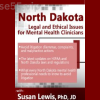-
×
 Legal and Ethical Issues in Behavioral Health in South Carolina By Lois Fenner - PESI
1 × $23.10
Legal and Ethical Issues in Behavioral Health in South Carolina By Lois Fenner - PESI
1 × $23.10 -
×
 Ten Best-Ever Anxiety Treatment Techniques By Margaret Wehrenberg - PESI
1 × $23.10
Ten Best-Ever Anxiety Treatment Techniques By Margaret Wehrenberg - PESI
1 × $23.10 -
×
 Understanding the Needs of the Dying: Bringing Hope, Comfort and Love to Life's Final Chapter By David Kessler - PESI
1 × $23.10
Understanding the Needs of the Dying: Bringing Hope, Comfort and Love to Life's Final Chapter By David Kessler - PESI
1 × $23.10 -
×
 Mindfulness-Based Stress Reduction for Teens By Gina Biegel - PESI
1 × $23.10
Mindfulness-Based Stress Reduction for Teens By Gina Biegel - PESI
1 × $23.10 -
×
 New Rules for Treating Trauma: Integrating Neuroscience for Resilience, Connection and Post-Traumatic Growth By Courtney Armstrong - PESI
1 × $23.10
New Rules for Treating Trauma: Integrating Neuroscience for Resilience, Connection and Post-Traumatic Growth By Courtney Armstrong - PESI
1 × $23.10 -
×
 Transgender & Gender Non-Binary (TGNB) Clients: Clinical Issues and Treatment Strategies By lore m dickey - PESI
1 × $23.10
Transgender & Gender Non-Binary (TGNB) Clients: Clinical Issues and Treatment Strategies By lore m dickey - PESI
1 × $23.10 -
×
 Ultimate Guide Technical Trading
1 × $23.10
Ultimate Guide Technical Trading
1 × $23.10 -
×
 Self-Regulation & Executive Functioning in Children and Adolescents: Visual Strategies and Hands-on Techniques to Provide Structure, Predictability, and Routines By Kathy Morris
1 × $23.10
Self-Regulation & Executive Functioning in Children and Adolescents: Visual Strategies and Hands-on Techniques to Provide Structure, Predictability, and Routines By Kathy Morris
1 × $23.10 -
×
 Healthy Hormone Done-For-You By Lorene Sauro
1 × $23.10
Healthy Hormone Done-For-You By Lorene Sauro
1 × $23.10 -
×
 Outbursts, Oppositional Defiance and Frustration in the Classroom: Self-Regulation Techniques to Reduce the Frequency, Severity and Duration of Problematic Behavior By Laura Ehlert - PESI
1 × $23.10
Outbursts, Oppositional Defiance and Frustration in the Classroom: Self-Regulation Techniques to Reduce the Frequency, Severity and Duration of Problematic Behavior By Laura Ehlert - PESI
1 × $23.10 -
×
 SHADOW SCOUTS BY JOHN WINGERT
1 × $15.40
SHADOW SCOUTS BY JOHN WINGERT
1 × $15.40
North Dakota Legal & Ethical Issues for Mental Health Clinicians By Susan Lewis – PESI
$249.00 Original price was: $249.00.$23.10Current price is: $23.10.
SKU: C55vip.11229h9eXFspj
Category: Download
Tags: Ethical Issues for Mental Health Clinicians, North Dakota, North Dakota Legal, Susan Lewis - PESI
Review of North Dakota Legal & Ethical Issues for Mental Health Clinicians by Susan Lewis – Digital Download!

North Dakota Legal & Ethical Issues for Mental Health Clinicians By Susan Lewis – PESI
Overview

Analysis of North Dakota’s Legal and Ethical Challenges for Mental Health Clinicians
Navigating the complex landscape of mental health care presents a myriad of legal and ethical hurdles, particularly in regions with stringent regulations such as North Dakota. This comprehensive review examines the insights of Dr. Susan J. Lewis, a distinguished psychologist and attorney, as she addresses these challenges. Her work provides clinicians with essential knowledge to manage their professional responsibilities effectively. By exploring the legal structures, best practices, and strategic recommendations outlined in her guide, mental health professionals can strengthen their practice while upholding compliance, client safety, and ethical integrity.
Grasping the Legal Landscape
A core element of Dr. Lewis’s analysis is her in-depth breakdown of North Dakota’s legal definitions of mental illness and the civil commitment statutes that govern mental health interventions. These regulations, outlined in Chapter 25-03.1-02 and North Dakota Century Code § 25-03.1-07, are fundamental for practitioners to understand.
Dr. Lewis underscores the necessity for mental health professionals to be well-versed in these laws, as they dictate the conditions under which an individual can be civilly committed. A clinician who is informed about these legal criteria is better equipped to assess client risks, intervene appropriately, and ensure both ethical care and legal compliance.
Additionally, she delves into the potential legal repercussions that clinicians may face when these laws are misinterpreted or ignored. Failure to adhere to legal requirements can lead to litigation, jeopardizing both client welfare and a clinician’s professional license. This highlights the urgent need for robust documentation practices and structured clinical protocols, which Dr. Lewis explores in depth.
Strengthening Legal Protection Through Documentation
One of Dr. Lewis’s key recommendations revolves around the significance of thorough and precise documentation. Accurate record-keeping is not only a pillar of quality client care but also a safeguard against legal disputes. Many professionals underestimate the legal ramifications of inadequate documentation, which can serve as a direct pathway to liability.
Dr. Lewis offers practical strategies to enhance documentation, ensuring compliance with both ethical and legal standards. She advises clinicians to maintain detailed records of treatment plans, client interactions, and legally relevant communications. Utilizing standardized formats and structured outlines can help ensure that documentation is both comprehensive and defensible.
She also emphasizes the need for clear and accessible language in clinical records. Well-structured documentation enhances accountability, facilitates communication between clinicians and clients, and minimizes the risk of misinterpretation in legal proceedings. Adopting these practices allows mental health professionals to mitigate risks and provide consistent, high-quality care.
Real-Life Scenarios: Applying Legal and Ethical Principles
Dr. Lewis reinforces her insights through compelling case studies that illustrate the practical application of legal and ethical concepts. These real-world examples help clinicians bridge the gap between theoretical knowledge and day-to-day practice. By examining cases that reflect the mental health landscape of North Dakota, she provides invaluable guidance on complex issues, such as determining when confidentiality must be broken to prevent harm.
For example, Dr. Lewis presents a scenario involving a clinician assessing a client exhibiting severe mental health symptoms that may warrant civil commitment. Through this case, she outlines the necessary steps, from evaluating the client’s condition to understanding the legal prerequisites for initiating commitment. She highlights the delicate balance between ethical obligations and legal responsibilities, equipping clinicians with the knowledge to make sound, legally compliant decisions that prioritize client well-being.
By incorporating practical case studies, Dr. Lewis fosters confidence among mental health professionals, helping them navigate the multifaceted challenges of their work while ensuring ethical and legal adherence.
Expanding Knowledge Through Continued Education
Recognizing the need for ongoing learning, Dr. Lewis provides an array of educational resources, including live webinars, pre-recorded sessions, and digital seminars. These resources make legal and ethical knowledge readily accessible, allowing clinicians to stay informed about evolving regulations and best practices in mental health care.
These learning tools play a critical role in professional development. Participating in webinars, for instance, grants clinicians immediate access to expert perspectives and updates on legislative changes that affect their practice. The convenience of digital formats enables busy professionals to engage with this content at their own pace, ensuring they maintain a comprehensive understanding of key legal and ethical issues.
Dr. Lewis also continuously updates her resources to reflect emerging research and regulatory shifts. Her commitment to ongoing education not only enhances individual competency but also elevates the overall standard of mental health care in North Dakota.
Ethical Dilemmas in Mental Health: Navigating Professional Responsibilities
Beyond legal frameworks, Dr. Lewis highlights the ethical complexities that mental health professionals must address. Comprehending North Dakota’s legal requirements is only part of the equation—clinicians must also uphold ethical standards in their client relationships. This dual emphasis on legal and ethical obligations is essential for responsible mental health practice.
Among the critical ethical concerns she discusses are confidentiality, informed consent, and maintaining professional boundaries. Clinicians must protect client privacy to build trust and foster honest communication. However, situations may arise where safeguarding confidentiality conflicts with the duty to protect clients or others from imminent harm.
Informed consent is another foundational ethical principle that Dr. Lewis stresses. Clinicians have a duty to ensure that clients fully understand their treatment, potential risks, and available alternatives. Clear communication and assessing a client’s capacity to make informed decisions are vital components of ethical practice.
By presenting real-world ethical dilemmas and guiding clinicians through decision-making processes, Dr. Lewis provides mental health professionals with the tools needed to uphold ethical integrity while navigating complex scenarios.
Encouraging Ongoing Professional Growth
Dr. Susan J. Lewis’s work not only sheds light on the intricate legal and ethical issues facing mental health clinicians but also underscores the importance of continued professional development. Practitioners in North Dakota are fortunate to have access to resources that bridge the divide between legal education and ethical practice.
As the field of mental health continues to evolve, ongoing training remains crucial. Dr. Lewis exemplifies a proactive approach to professional growth, encouraging clinicians to stay informed, seek educational opportunities, and adapt to legal changes. This commitment to continuous learning enhances individual practice and strengthens the overall standard of mental health care.
Final Thoughts
Understanding the legal and ethical complexities outlined by Dr. Susan J. Lewis is essential for mental health clinicians in North Dakota. By translating intricate legal jargon into practical guidance, she empowers professionals to navigate their responsibilities with confidence. Engaging with her resources offers a deeper understanding of the interplay between law and ethical practice, fostering a culture of informed decision-making, professional integrity, and compliance. Ultimately, her work serves as a crucial tool in ensuring the highest standards of mental health care for both clinicians and their clients.
Frequently Asked Questions:
Business Model Innovation: We operate a group buying strategy, allowing participants to share costs and access popular courses at reduced prices. This model benefits individuals with limited financial resources, despite concerns from content creators about distribution methods.
Legal Considerations: The legality of our operations involves complex issues. Although we don’t have explicit permission from course creators to resell their content, there are no specific resale restrictions stated at the time of purchase. This ambiguity creates an opportunity for us to provide affordable educational resources.
Quality Control: We ensure that all course materials purchased are identical to those offered directly by the creators. However, it’s important to understand that we are not official providers. As such, our offerings do not include:
– Live coaching calls or sessions with the course author.
– Access to exclusive author-controlled groups or portals.
– Membership in private forums.
– Direct email support from the author or their team.
We aim to reduce the cost barrier in education by offering these courses independently, without the premium services available through official channels. We appreciate your understanding of our unique approach.
Be the first to review “North Dakota Legal & Ethical Issues for Mental Health Clinicians By Susan Lewis – PESI” Cancel reply
You must be logged in to post a review.















Reviews
There are no reviews yet.